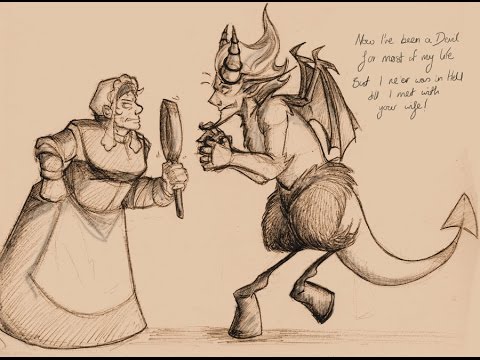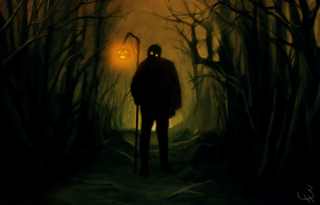The ballad The Farmer’s Curst Wife has spread widely in England, Ireland, Scotland and America with fairly similar text versions, albeit with melodies declined in a different way.
THE DEVIL AND THE PLOWMAN (english version)
Lilli burlero
THE FARMER’S CURSED WIFE (american version)
KILLYBURN BRAE (Irish version)
KELLYBURN BRAES (Scottish version)
The theme of the Devil who tries to take a sinner to hell is a classic of the Celtic tales, made exemplary in the story of Jack O’Lantern: on the night of Halloween the Devil walks the earth to reclaim the souls of men, but Stingy Jack was able to decive him with some tricks; and for two years in a row!
At last the Devil, scornfully, gives up Jack’s soul for another ten years. When Jack dies for his too many vices both the doors of Paradise and those of hell are barred for him; forced to wander in the dark, he receives as a gift from the Devil a ember to illuminate his path; since then Jack continues to roam the Limbo in search of a dwelling he will never find, with his pumpkin-shaped lantern (which originally, before the story landed in America, was a turnip (HOP TU NAA Isle of Manx)
Devil and the Farmer’s wife
[ Roud 160 ; Master title: The Farmer’s Curst Wife ; Child 278 ; G/D 2:320 ; Ballad Index C278 ; Bodleian Roud 160 ; Wiltshire 982 ; Mudcat 17306 ; trad.]
In the ballad “Devil and the Farmer’s wife” (also known as the Little Devils-Jean Ritchie) dating back to 1600, the woman deserves the hell for her spiteful and disrespectful behavior; but the devil himself cannot tame her, indeed he risks losing his tranquility. The similarity between the two stories occurs in one of the nineteenth-century versions (Macmath Manuscript 1862 cf) in which the devil says referring to the woman: “O what to do with her I cane weel tell; she’s no fit for heaven, and she’ll no bide in hell! ” just like Jack who found both the Gate of Heaven and Hell to be closed.
The ballad is probably even older, and some scholars link it to Chaucer’s Tales of Canterbury (Waltz and Engle).
THE DEVIL AND THE PLOWMAN

The ballad appears in print in London in 1630 with the title “The Devill and the Scold” to the tune “The Seminary Priest” cf
“Of this ballad there are two extant editions, the earlier being in the Roxburghe Collection. The second is in the Rawlinson Collection, No. 169, published by Coles, Vere, and other stationers– a trade edition, of the reign of Charles II. Mr. Payne Collier includes “The Devil and the Scold” in his volume of Eoxburghe Ballads, and says: “This is certainly an early ballad: the allusion, in the second room, to Tom Thumb and Robin Goodfellow (whose ‘Mad Pranks’ had been published before 1588) is highly curious, and one proof of its antiquity .. “
The ballad is often printed in broadside throughout the eighteenth and nineteenth centuries and collected in two textual variants in “The English And Scottish Popular Ballads” (1882-1898) by Francis James Child at number 278 with the title “The Farmer’s Curst Wife “.
The song was collected in 1903 by Henry Burstow, Sussex and published in The Penguin Book of English Folk Songs by Ralph Vaughan Williams and A.L. Lloyd (1959). Very similar to the text version reported by James Henry Dixon in “Ancient Poems, Ballads and Song” (1846) (Child # 278 version A cf).
Thus writes A.L. Lloyd in 1960 in the liner notes of “A Selection from the Penguin Book of English Folk Songs”, echoing the notes reported by Child himself: The tale of the shrewish wife who terrifies even the demons is ancient and widespread. The Hindus have it in a sixth century fable collection, the Panchatantra. It seems to have traveled westward by Persia, and to have spread to almost every European country. In the early versions, the farmer makes a pact with his wife in return for a pair of plow oxen. Vaughan Williams got the present ballad from the Horsham shoemaker and bell-ringer, Henry Burstow. Mr Burstow whistled the refrains that in our performance are played by the concertina. Whistling was a familiar way of calling up the Devil (hence the sailors who whistling may raise a storm). (from here)
The shrewish wife is taken back to her husband who believed he had succeeded in making fun of the devil! Given the subject is among the most popular ballads in medieval festivals and pirate gatherings !!
There was an old farmer in Sussex did dwell
And he’d a bad wife as many knew well(1)
To me fal-de-ral little law-day.(2)
The Devil he came to the old man at plough,
Saying. ‘One of your family I must have now.
‘Now it isn’t for you nor yet for your son,
But that scolding old wife as you’ve got at home.’
‘Oh take her, oh take her with all of my heart,
And I wish she and you may never more part.’
So the devil he took the old wife on his back(3),
And lugged her along like a pedlar’s pack./
He trudged along till he reached his front gate,
Says: ‘Here, take in an old Sussex chap’s mate.‘
There was thirteen imps(4) all dancing in chains;
She up with her pattens and beat out their brains.
Two more little devils jumped over the wall,
Saying: ‘Turn her out, father, she’ll murder us all.’
So he bundled her up on his back again,/ And to her old husband he took her again.
‘I’ve been a tormentor the whole of my life,
But I was never tormented till I met your wife.’
And now to conclude and make an end,/ You see that the women is worse than the men,
If they got sent to Hell, they get kicked back again (5)
1) the sentence wants to underline the less than submissive character of the woman!
2) Whistling was a way to summon the devil!
3) the image of women straddling the devil is supported by a vast iconography dating back to the Middle Ages
4) the image of the devils literally massacred by the woman is very funny, unfortunately the domestic reality was very different and in general it was women who suffered mistreatment and violence.
5) Kim edited the final verse to show the strength of women:
And now to conclude and make an end
you see that us women are strong
even when we get sent to hell,
we come straight back again
Kim Lowings & The Greenwood in This Life, 2012 l’album d’esordio.
THE FARMER’S CURSED WIFE: american version
Here too we find an almost identical textual version declined however with bluegrass melodies. The ending is very hilarious and often without the moral: the old farmer, seeing his wife return, rejected by the devil himself, decides to run and never go home again!
Heather Dale from Perpetual Gift 2012.
Jean Ritchie, British Traditional Ballads in the Southern Mountains, Volume 2
Well there was an old man living up on the hill/ If he ain’t moved on, he’s a livin’ there still CHORUS Hi diddle ai diddle hi fi, diddle ai diddle ai day Now the Devil he came to him one day said “One of your kin I’m gonna take away“/ He said “Oh please don’t take my only son/ There’s work on the farm that’s gotta be done. Oh but you can have my nagging wife I swear by God, she’s the curse of my life” So they marched on down to the gates of hell/ He Said “Kick on the fire boys, we’ll roast her well” Out came a little devil with a spit and chain that she upped with her foot and knocked out his brain Out came a dozen demons then a dozen more But when she was done they was flat on the floor | So all those little demons went scrambling up the wall saying “tale her back, daddy, she’ll murder us all“ So the Farmer woke up and he looked out the crack/ and he saw that devil bringing her back! He said:”Here’s your wife both sound and well/ if I kept her any longer she’d’ve tore up the hell“ The old man jumped and he bit his tongue then he ran for the hills in a flat out run He was heard to yell, as he ran o’er the hill/ “if the devil won’t have her, ‘be damned if I will“ |

